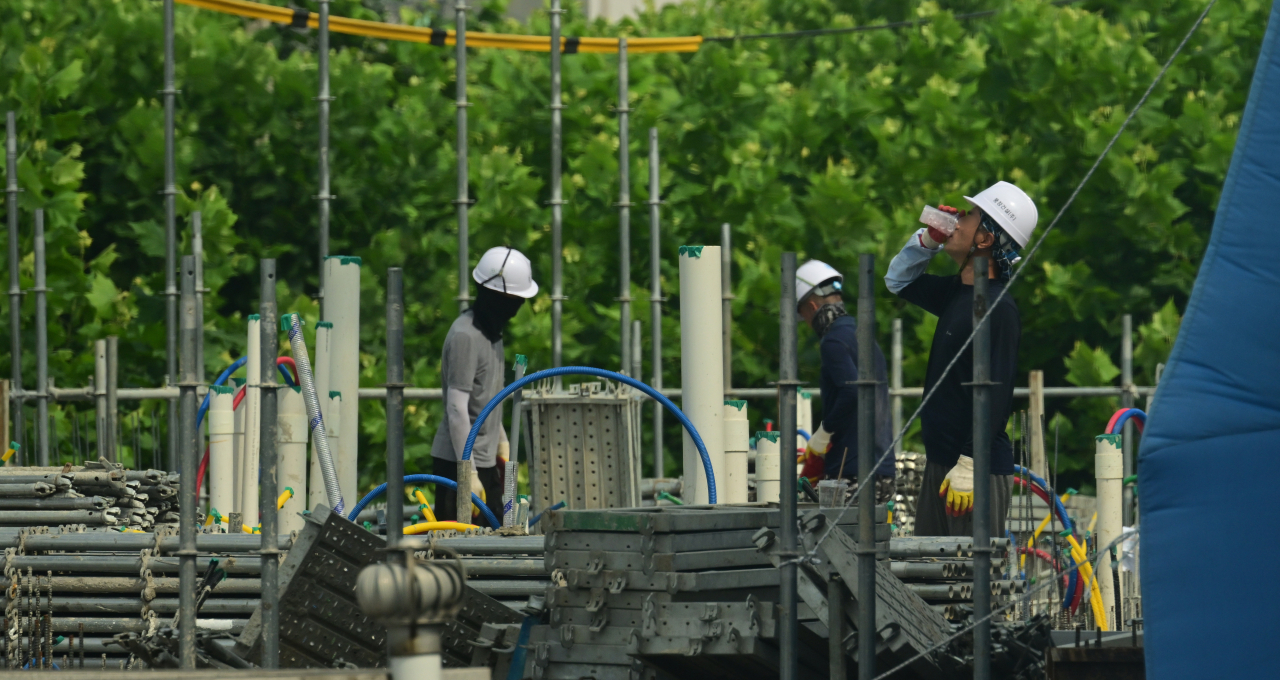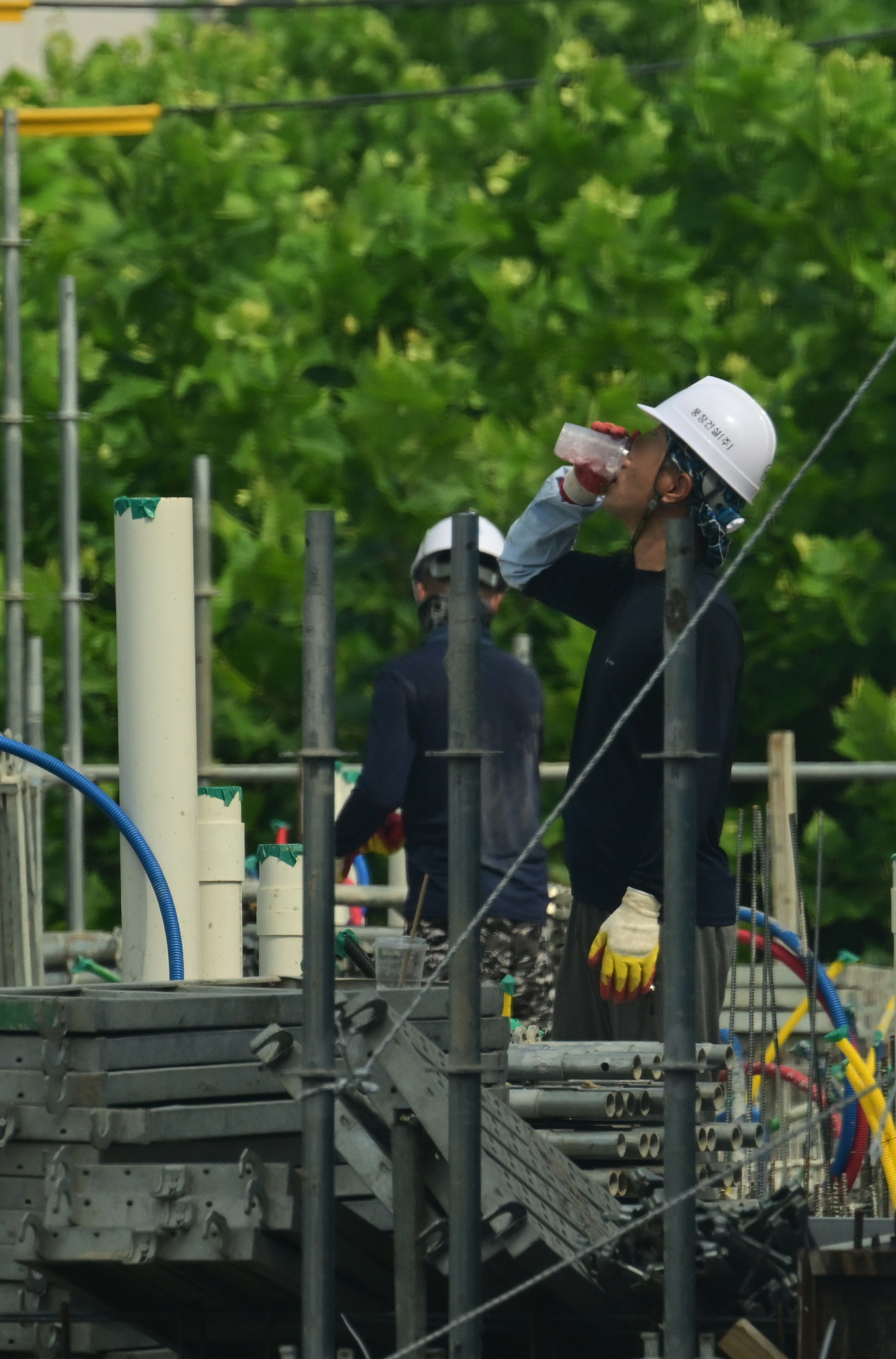Rethinking work, vacation in era of 'global boiling'
Extreme summer heat poses life-threatening risks to outdoor laborers, while making travel more challenging for vacationers
By Jung Min-kyungPublished : Aug. 2, 2023 - 15:15

Summer heat is becoming increasingly deadly in many parts of the world, as the Earth has entered an "era of global boiling," as declared by the United Nations last week.
South Korea is among the countries that are grappling with extreme heat, with the number of victims of heat-related illnesses rising at an alarming pace.
According to fire authorities, a total of 23 people have died from May 20 to Monday due to heat-related illnesses. The number is more than triple the total 7 deaths in the same period last year.
The Korea Disease Control and Prevention Agency (KDCA) put the number of patients with heat-related illnesses here at 1,117 so far this year as of Monday, growing at a faster pace compared to last year.

The full-year tally has been on the rise from 1,376 in 2021 to 1,564 in 2022, according to the KDCA.
This trend may be a sign for many South Koreans -- who typically take short summer holidays around the end of July and the start of August -- to rethink their summer routines, experts say.
Heatstroke deaths on duty
On June 19, a 29-year-old employee at a Costco branch in Hanam, Gyeonggi Province suddenly collapsed. Kim Dong-ho's job was to manage the store’s carts, which required him to move back and forth between the parking lot and the store. While the store had air conditioning, the parking area did not.
Kim was rushed to a nearby hospital, but died due to dehydration and blood clotting near his lung due to extreme heat exposure.
That day was a scorching hot day in Hanam. At one point, the temperature in the area spiked to 35.2 degrees Celsius, prompting a heat wave advisory to be issued. Such an advisory is issued when the highest perceived temperature is expected to be 33 C or higher for two or more consecutive days. It is also issued when significant damage is expected due to a sudden increase in the perceived temperature or prolonged heat wave conditions.
While government guidelines state that outdoor workers must be given a 10 to 15-minute break every hour during heat wave advisories, it appears that these guidelines were not strictly followed at the Costco store where Kim worked.
Kim is among a growing number of heatstroke causalities who has died on duty in recent years.
"Manual labor or any jobs that require outdoor work are obviously the most vulnerable group to heat-related illnesses and deaths," Lee Wan-hyung, a professor of occupational and environmental medicine at Gachon University, told The Korea Herald on Wednesday.
"They have very few options in choosing their time and workplace," he added.
Among the 1,564 people who sought treatment for heat-related illnesses last year, 37.1 percent, or 581, fell ill in outdoor work environments such as construction sites, the KDCA data showed. Those that fell ill while working in fields and paddies amounted to 14.7 percent or 230 and those in indoor workplaces came to 127 or 8.2 percent.
The high ratio of victims in outdoor work environments comes despite Article 24 of the nation's Occupational Safety And Health Act, which states that business owners "shall take measures necessary for the prevention of the following health problems," which include health problems due to high temperatures.
In addition to mandatory 10-to-15-minute breaks for workers, the government also mandates employers to provide a shaded place to use during breaks for workers who work outdoors when they are directly exposed to hot weather.
As seen in the Costco case, existing measures often provide little protection to workers from deadly heat, experts stressed.
"Koreans tend to brush off heat waves as part of summer weather. This needs to stop, and we need to start treating it as a potential risk that could lead to death,” Lee stressed.
Heat factor in vacation planning
Long summer breaks are not common in South Korea, where many workers take an average of 4.8 days off work for summer holidays, according to a local survey released in June.
Typically, a considerable portion of vacationers travel in late July-early August. Another survey showed that those planning a domestic summer vacation are most likely to do so between July 29 and Aug. 4.
The problem is that this traditional peak season may be the worst time to travel, not just because of heavy traffic, large crowds and high prices -- but also due to the extreme weather.
"Traveling in August feels like paying to get tortured under suffocating heat. The best place to be is indoors with air conditioning," a 43-year-old office worker surnamed Lee told The Korea Herald.
Since her 2018 vacation in Jeju, during which it was just too unbearably hot to step outside, she hasn't planned a summer vacation.
For those planning overseas vacations, the extreme weather is becoming an increasingly important factor to consider.
European countries like Italy, Greece and Spain -- some of the most popular summer travel destinations for Koreans -- recently issued health warnings as their temperatures spiked to over 40 C. Recent temperatures in Southeast Asian countries such as Vietnam have reached 40 C as well.
Some insurers in the US and the UK have rolled out products that helps travelers get refunds if their travel destinations become "too hot" to visit.
Lee Ji-min, a 32-year-old office worker in Seoul, is among those who have decided to push back their travel plans because of the global heat wave.
"I had a trip booked to Italy in the second week of August, but I had to cancel it with the temperature in Rome recording 46 C," she told The Herald.
"I'm going to push my travel plans back to October. Many of my friends are also delaying their plans because they have nowhere to go in this weather anyway," she added.






![[Weekender] How DDP emerged as an icon of Seoul](http://res.heraldm.com/phpwas/restmb_idxmake.php?idx=644&simg=/content/image/2024/04/25/20240425050915_0.jpg&u=)




![[Music in drama] An ode to childhood trauma](http://res.heraldm.com/phpwas/restmb_idxmake.php?idx=644&simg=/content/image/2024/04/25/20240425050929_0.jpg&u=)







![[Herald Interview] Mistakes turn into blessings in street performance, director says](http://res.heraldm.com/phpwas/restmb_idxmake.php?idx=652&simg=/content/image/2024/04/28/20240428050150_0.jpg&u=20240428174656)
